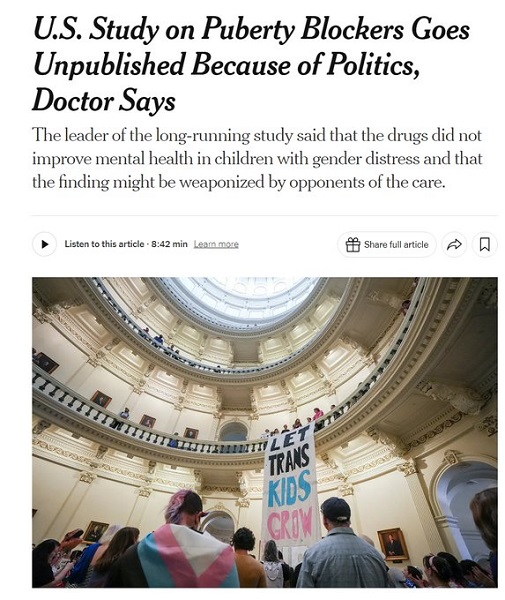Health
Doctor withholds results of study that fails to show transitioning improves kids’ health

From LifeSiteNews
A prominent doctor has been refusing to release the findings of a federally funded “transgender youth” study she began in 2015 because the results did not match the conclusions she hoped for, according to an explosive report in The New York Times.
The Times reported that Johanna Olson-Kennedy, medical director of the Center for Trans Youth Health & Development at Children’s Hospital in Los Angeles, “recruited 95 children from across the country and gave them puberty blockers,” then “followed the children for two years to see if the treatments improved their mental health.” She told the National Institutes of Health (NIH) that she expected to find that the kids would show “decreased symptoms of depression, anxiety, trauma symptoms, self-injury, and suicidality, and increased body esteem and quality of life over time.”
However, the study did not show the children doing better than they started. “Before receiving the drugs, around one-quarter of the group reported depression symptoms and significant anxiety, and one quarter reported ever having thoughts of suicide,” the Times says. “Eight percent reported a past suicide attempt.”
In an interview with the Times, Olson-Kennedy attempted to argue that the children’s starting point actually wasn’t so bad after all, and therefore the lack of change was not concerning: “They’re in really good shape when they come in, and they’re in really good shape after two years.” On follow-up, she claimed her “good shape” comment was referring to data averages, and her conclusion about the full data was still pending.
Regardless, in the nine years since the study commenced, Olson-Kennedy has still yet to publish any of the data for outside observers to analyze for themselves, which she justified by claiming, “I do not want our work to be weaponized. It has to be exactly on point, clear and concise. And that takes time.”
NEW: Azeen Ghorayshi reports in the @nytimes that prominent gender clinician Johanna Olson-Kennedy of @ChildrensLA has refused to publish data from a study on puberty blockers, fearing that the unimpressive results will be "weaponized" by critics of "gender-affirming care." 🧵 pic.twitter.com/DREXSNsFYk
— Leor Sapir (@LeorSapir) October 23, 2024
https://t.co/st0O6ox763 https://t.co/WZbnXv6DO2
— Leor Sapir (@LeorSapir) October 23, 2024
A significant body of evidence shows that “affirming” gender confusion carries serious harms, especially when done with impressionable children who lack the mental development, emotional maturity, and life experience to consider the long-term ramifications of the decisions being pushed on them, or full knowledge about the long-term effects of life-altering, physically transformative, and often-irreversible surgical and chemical procedures.
Studies find that more than 80% of children experiencing gender dysphoria outgrow it on their own by late adolescence, and that even full “reassignment” surgery often fails to resolve gender-confused individuals’ heightened tendency to engage in self-harm and suicide — and may even exacerbate it, including by reinforcing their confusion and neglecting the actual root causes of their mental strife.
Many oft-ignored “detransitioners,” individuals who attempted to live under a different “gender identity” before embracing their sex, attest to the physical and mental harm of reinforcing gender confusion as well as to the bias and negligence of the medical establishment on the subject, many of whom take an activist approach to their profession and begin cases with a predetermined conclusion that “transitioning” is the best solution.
“Gender-affirming” physicians have also been caught on video admitting to more old-fashioned motives for such procedures, as with a 2022 exposé about Vanderbilt University Medical Center’s Clinic for Transgender Health, where Dr. Shayne Sebold Taylor said outright that “these surgeries make a lot of money.”
In December, the U.S. Supreme Court will begin considering arguments about the permissibility of state laws prohibiting the gender “transitioning”” of minors.
Addictions
Four new studies show link between heavy cannabis use, serious health risks

Cannabis products purchased in Ontario and B.C., including gummies, pre-rolled joints, chocolates and dried flower; April 11, 2025. [Photo credit: Alexandra Keeler]
By Alexandra Keeler
New Canadian research shows a connection between heavy cannabis use and dementia, heart attacks, schizophrenia and even death
Six months ago, doctors in Boston began noticing a concerning trend: young patients were showing up in emergency rooms with atypical symptoms and being diagnosed with heart attacks.
“The link between them was that they were heavy cannabis users,” Dr. Ahmed Mahmoud, a cardiovascular researcher and physician in Boston, told Canadian Affairs in an interview.
These frontline observations mirror emerging evidence by Canadian researchers showing heavy cannabis use is associated with significant adverse health impacts, including heart attacks, schizophrenia and dementia.
Sources warn public health measures are not keeping pace with rapid changes to cannabis products as the market is commercialized.
“The irony of this moment is that society’s risk perception of cannabis is at an all-time low, at the exact moment that the substance is probably having increasingly negative health impacts,” said Dr. Daniel Myran, a physician and Canada Research Chair at the University of Ottawa. Myran was lead researcher on three new Canadian studies on cannabis’ negative health impacts.
Legalization
Canada was the first G7 country to create a commercial cannabis market when it legalized the production and sale of cannabis in 2018.
The drug is now widely used in Canada.
In the 2024 Canadian Cannabis Survey, an annual government survey of cannabis trends, 26 per cent of respondents said they used cannabis for non-medical purposes in the past year, up from 22 per cent in 2018. Among youth, that number was 41 per cent.
Health Canada’s website warns that cannabis use can lower blood pressure and raise heart rates, which can increase the risk of a heart attack. But the warnings on cannabis product labels vary. Some mention risks of anxiety or effects on memory and concentration, but make no mention of cardiovascular risks.
The annual cannabis survey also shows a significant percentage of Canadians remain unaware of cannabis’ health risks.
In the survey, only 70 per cent of respondents said they had enough reliable information to make informed decisions about cannabis use. And 50 per cent of respondents said they had not seen any education campaigns or public health messages about cannabis.
At the same time, researchers are finding mounting evidence that cannabis use is associated with health risks.
A 2023 study by researchers at the University of Calgary, the University of Alberta and Alberta Health Services found that adults with cannabis use disorder faced a 60 per cent higher risk of experiencing adverse cardiovascular events — including heart attacks. Cannabis use disorder is marked by the inability to stop using cannabis despite negative consequences, such as work, social, legal or health issues.
Between February and April of this year, three other Canadian studies linked frequent cannabis use to elevated risks of developing schizophrenia, dementia and mortality. These studies were primarily conducted by researchers at the Ottawa Hospital Research Institute and ICES uOttawa (formerly the Institute for Clinical Evaluative Sciences).
“These results suggest that individuals who require hospital-based care for a [cannabis use disorder] may be at increased risk of premature death,” said the study linking cannabis-related hospital visits with increased mortality rates.
The three 2024 studies all examined the impacts of severe cannabis use, suggesting more moderate users may face lower risks. The researchers also cautioned that their research shows a correlation between heavy cannabis use and adverse health effects, but does not establish causality.
Subscribe for free to get BTN’s latest news and analysis – or donate to our investigative journalism fund.
Budtenders
Health experts say they are troubled by the widespread perception that cannabis is entirely benign.
“It has some benefits, it has some side effects,” said Mahmoud, the Boston cardiovascular researcher. “We need to raise awareness about the side effects as well as the benefits.”
Some also expressed concern that the commercialization of cannabis products in Canada has created a race to produce products with elevated levels of THC, the main psychoactive compound that produces a “high.”
THC levels have more than doubled since legalization, yet even products with high THC levels are marketed as harmless.
“The products that are on the market are evolving in ways that are concerning,” Myran said. “Higher THC products are associated with considerably more risk.”
Myran views cannabis decriminalization as a public health success, because it keeps young people out of the criminal justice system and reduces inequities faced by Indigenous and racialized groups.
“[But] I do not think that you need to create a commercial cannabis market or industry in order to achieve those public health benefits,” he said.
Since decriminalization, the provinces have taken different approaches to regulating cannabis. But even in provinces where governments control cannabis distribution, such as New Brunswick and Nova Scotia, products with high THC levels dominate retail shelves and online storefronts.
In Myran’s view, federal and provincial governments should instead be focused on curbing harmful use patterns, rather than promoting cannabis sales.
Ian Culbert, executive director of the Canadian Public Health Association, thinks governments’ financial interest in the cannabis industry creates a conflict of interest.
“[As with] all regulated substances, governments are addicted to the revenue they create,” he said. “But they also have a responsibility to safeguard the well-being of citizens.”
Culbert believes cannabis retailers should be required to educate customers about health risks — just as bartenders are required to undergo Smart Serve training and lottery corporations are required to mitigate risks of gambling addiction.
“Give ‘budtenders’ the training around potential health risks,” he said.
“While cannabis may not be the cause of some of these negative health events … it is the intersection at which an intervention can take place through the transaction of sales. So is there something we can do there that can change the trajectory of a person’s life?”
This article was produced through the Breaking Needles Fellowship Program, which provided a grant to Canadian Affairs, a digital media outlet, to fund journalism exploring addiction and crime in Canada. Articles produced through the Fellowship are co-published by Break The Needle and Canadian Affairs.
Our content is always free – but if you want to help us commission more high-quality journalism, consider getting a voluntary paid subscription.
Autism
UK plans to test children with gender confusion for autism

From LifeSiteNews
All children referred to a ‘gender clinic’ in the UK will soon be screened for autism and other ‘neurodevelopmental conditions’ due to the high rate of autism among gender-confused people.
According to The Telegraph, the National Health Service has drafted plans to test all children who believe they are “transgender” for autism due to findings in the Cass Review, which noted that “mental health conditions were disproportionately common among children and young people with gender dysphoria.”
“Every child referred to a gender clinic will be ‘screened for neurodevelopmental conditions’ such as autism and ADHD under new guidance,” The Telegraph reported. “Medics will also evaluate each child’s mental health, their relationship with their family and their sexual development, including whether they are experiencing same-sex attraction.”
Many parents, experts, and psychiatrists have been calling for such screenings for years, but transgender activists pushing the so-called “gender-affirming care” model refused to consider the intersection of autism and other factors and gender dysphoria. Consequently, many parents have seen their autistic children sucked into the gender ideology; the newsletter Parents with Inconvenient Truths about Trans has published heartbreaking stories almost weekly.
The NHS will now be moving away from the “medical model” or “gender-affirming care” to a “holistic” approach. This new guidance will be released for public consultation shortly and come into effect later in 2025. According to The Telegraph:
However, some groups criticized a “serious flaw” in the policy as it leaves an open door to the use of cross-sex hormones. They also condemned its absence of recognition of the wider societal issues to which children are exposed. The new NHS Children and Young People’s Gender Service will explore eight key areas of a child’s life.
To assess “development”, doctors will take a “detailed history” of the child’s social, cognitive and physical growth, particularly because of the “substantial” changes that take place during puberty. They will screen children for autism and learning disabilities and look into whether further “cognitive assessments” are necessary.
The specification says: “Given the high prevalence of neurodiversity identified within this population, all those attending the NHS Children and Young People’s Gender Service should receive screening for neurodevelopmental conditions.” The “multidisciplinary team” of experts, including a consultant specializing in neurodevelopmental disorders, will create a treatment plan for each individual depending on their diagnosis.
If, during the screening, a “neurodevelopmental condition” is identified, a referral to the Paediatric Neurodevelopmental Service or Paediatric ASD Service will be likely, according to the guidance. Physicians will seek to determine whether the child’s symptoms are a result of underlying conditions or gender dysphoria, and their conditions will be reviewed longer term. Dr. Michael Craig, the clinical lead from the NHS National Autism Unit from 2007 to 2023, “previously estimated half of patients seen by Tavistock’s clinic had autism after observing sessions.”
Hilary Cass observed the same trend, noting that one study found that autism was a “common denominator” in people identifying as transgender, with a recent study determining that gender-confused people were three to six times more likely to be autistic. The spike in girls identifying as transgender, Cass noted, was in part due to “undiagnosed autism, which is often missed in adolescent girls.” The new NHS guidance noted that there has been a “reluctance to explore or address” mental health issues, in part because gender dysphoria has not been classified as a mental illness under the “gender-affirming care” model.
The new holistic NHS approach will also include examining the social context of children struggling with gender dysphoria:
Another key area is dubbed “family context”, with medics being tasked to paint a picture of each child’s upbringing and familial relationships. The specification noted that “there is evidence of an increased frequency of family parental physical and/or mental ill health and other family stressors in this group”.
Under the section titled sexual development, knowledge and sexual orientation, it said “clinicians should seek to understand the child/young person’s emerging sexuality and sexual orientation”. If this has been a previous issue, doctors should consider whether the child was exposed to “adversity and trauma”. They will also examine the children’s physical health needs and the impact of any long-term conditions, along with their broader well-being, school relationships and educational attainment.
Critics of “gender-affirming care” have been enthusiastic about this proposed guidance, with Dr. Louise Irvine of the Clinical Advisory Network on Sex and Gender telling The Telegraph that: “The new service recognizes that many also experience mental health, neurodevelopmental and/or personal, family or social complexities in their lives. The challenge will be to ensure NHS services can provide prompt access to appropriate service for any identified needs as waiting lists are currently very long.” Irvine did note the “serious flaw” in the guidance being that it “leaves the door open for referral of children and young people under 18 for cross-sex hormones,” which she called unscientific and “irresponsible.”
-

 C2C Journal2 days ago
C2C Journal2 days ago“Freedom of Expression Should Win Every Time”: In Conversation with Freedom Convoy Trial Lawyer Lawrence Greenspon
-

 2025 Federal Election1 day ago
2025 Federal Election1 day agoColumnist warns Carney Liberals will consider a home equity tax on primary residences
-

 Opinion2 days ago
Opinion2 days agoCanadians Must Turn Out in Historic Numbers—Following Taiwan’s Example to Defeat PRC Election Interference
-

 International1 day ago
International1 day agoJeffrey Epstein accuser Virginia Giuffre reportedly dies by suicide
-

 2025 Federal Election1 day ago
2025 Federal Election1 day agoNine Dead After SUV Plows Into Vancouver Festival Crowd, Raising Election-Eve Concerns Over Public Safety
-

 2025 Federal Election1 day ago
2025 Federal Election1 day agoMark Carney: Our Number-One Alberta Separatist
-

 2025 Federal Election19 hours ago
2025 Federal Election19 hours agoCanada is squandering the greatest oil opportunity on Earth
-

 International15 hours ago
International15 hours agoU.S. Army names new long-range hypersonic weapon ‘Dark Eagle’








